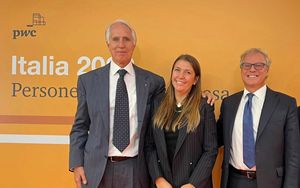(Finance) – Lo sport can have a fundamental role in ccounteract the effects of the so-called “demographic winter” and contribute to Italian economic development. This is the main message that emerged today during the meeting entitled “Demographic evolution: the role of sport“, organized by PwC Italyin which the Minister for Sport and Youth Andrea Abodi.
An appointment of the “Italy 2023: People, Work, Business” cycle, the platform for dialogue with the leading exponents of the world of institutions and business promoted in collaboration with the Gedi publishing group, which saw the participation of Giovanni Andrea Toselli, President and CEO PwC Italia, Giovanni MalagòPresident of CONI, Ilaria ValentinuzziAmbassador Silver Economy Network, Nerio AlessandriFounder and CEO of Technogym, Alessandro GrandinettiMarkets Leader PwC Italia, moderated by Alessandro De AngelisHuffPost Deputy Editor.
To the January 1, 2023 our country’s birth rate reached a new historic low, with 1.24 children per woman (almost one point below the extinction threshold), an average age of 46.4 years (increased by approximately 6 years since 2000 and increasing by another 4 years by 2040) and an over-65 population that constitutes the 24.1% of the total population (increasing compared to the previous year). The ratio between the number of elderly and young people is also constantly growing: to date it is 1.2 over-65s for every young person aged 15-34 (it was 0.7 on 1 January 2002). According to Istat estimates, by 2050 the population in the 15-64 age group will constitute just over half of the population, while the over-65 population will reach 35%, with important consequences for the economic and social structure of the country. The progressive aging of the Italian population will lead to a significant increase in healthcare spending, estimated at 220 billion (9.5% of GDP) in 2050, compared to the current €130 billion (6.7% of GDP).
During the meeting, Minister Abodi underlined how sport is a “social immune defense”. Doing physical activity helps improve the quality of life and above all allows you to develop positive synergies between individual and collective well-being and productivity. The sports sector can therefore play a fundamental role not only for the health of individuals but also for Italian economic development.
To date though Italy, with a per capita expenditure dedicated to sport of 74 euros, is below the European average both in terms of public expenditure per capita dedicated to sport (sixteenth among EU countries vs EU average of €120), both for its impact on total public spending (twenty-fifth among EU countries with 0.46% vs EU average 0.75%). According to the WHO, physical inactivity increases the risk of death by up to 30% compared to an active lifestyle. In Italy, 94.5% of adolescents do not practice physical activity as the WHO would recommend and, in light of the potential benefits, Italian public spending on sport is rather undersized.
In a European comparison Italy ranks below the EU-27 average also for the share of the over-15 population who dedicates at least 150 minutes a week to physical-sports activity in their free time (20% vs. 33%), placing it well below countries such as Germany (49%), Denmark (54 %) and Sweden (55%). Furthermore, only 8.8% of the population dedicates at least 30 minutes a day to physical exercise, almost half compared to the 15% of the EU-27 average.
Despite that, sport represents an important economic sector for Italy with 104 thousand employed in the sporting sector alone. In 2022 there will be 67,000 sports clubs, 10,000 manufacturing companies, 9,500 facility management companies and 50 publishing and betting companies, which employ a total of 405 thousand workers and produce revenues of around €102 billion, contributing to 3.4% of GDP (by of which 0.46% given by the contribution of manufacturing companies, 1.42% by sports and facility management companies, 0.90% by media/sports events/betting and 0.60% by the induced socio-economic value).
A further relevant aspect of the sports industry is the social role it plays. In 2022, the economic value of positive externalities in the sports industry was €11.4 billion (+13% compared to 2019) and contributed to 0.6% of GDP.
The impact is divided into three main points: the contribution of positive performanceswhich have directly impacted the employment of sports clubs for an annual economic value of 4.3 billion (38% of the total impact); the social impact, the implicit value of volunteering in the sports sector (approximately 114 million hours provided in 2022) and the containment of NEETs, for an annual economic value of 1.5 billion (13% of the total impact); the health impact, Regular physical activity allows savings on private and public health spending, for an estimated annual economic value of 5.6 billion (49% of the total impact).
Furthermore, Italy it is also lacking in terms of infrastructural equipment: in 2022 there will be 77,000 systems, approximately 131 for every 100 thousand inhabitants, of which 60% are over 40 years old, with consequent repercussions in terms of energy inefficiency and emissions. The school situation is also critical: 6 out of 10 schools do not have sports facilities. In this context, the PNRR allocates 1 billion for sports infrastructure, of which 700 million is aimed at maintenance. The expected amount is equal to only 0.5% of the total Plan.
Giovanni Andrea Toselli, President and CEO of PwC Italia explained “The lockdown has given us the opportunity to reevaluate the importance of sport. The private sector must become aware that the promotion of sporting activity is in the economic interest of the country. Today it is even more evident that a healthy population, and aware of the role of physical activity, can reverse the demographic winter we are experiencing and increase the country’s productivity. The 2026 Winter Olympics, in this sense, could be a driving force capable of activating positive externalities for the entire system and capable of giving a further impetus to the necessary cultural change on the role of sport”.
